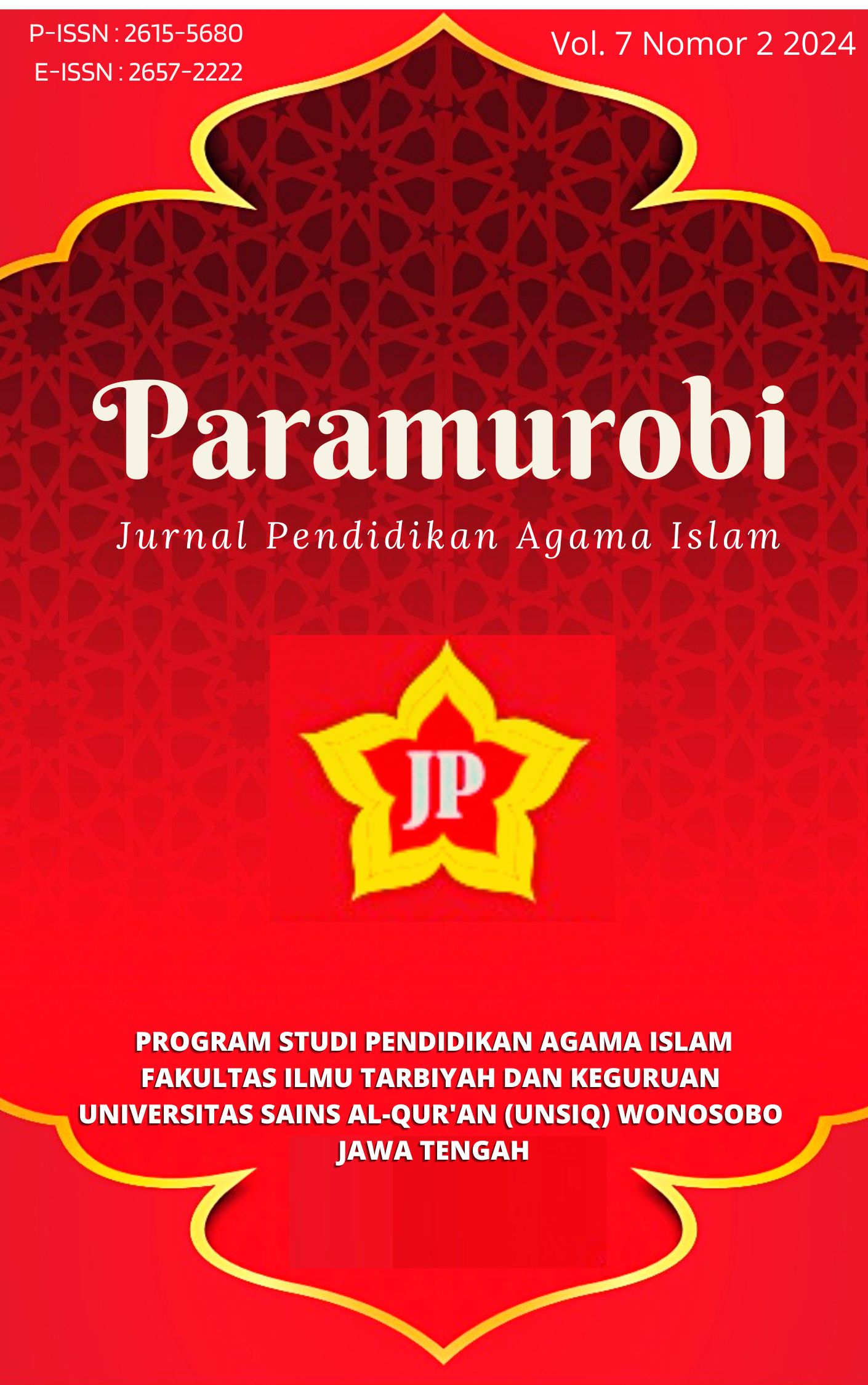STRATEGI MENGATASI SISWA YANG TIDUR SELAMA PEMBELAJARAN
DOI:
https://doi.org/10.32699/paramurobi.v7i2.7238Keywords:
pola tidur, penelitian tindakan kelas, pembelajaran di kelasAbstract
This study aims to reduce students sleeping habits during learning in class 8C SMP Negeri 3 Sampang through the Classroom Action Research (PTK) method using teh Kurt Lewin model. Conducted in the even semester of the 2023/2024 school year, the study involved 32 students with a focus on changes in sleep patterns and learning concentration. From the results, internal and external strategies proved effective, including efforts to motivate students about the negative impact of sleep deprivation on health and learning performance, as well as changing the classroom atmosphere and conducting learning outside the classroom. The data showed that the majority of students experienced disturbed sleep patterns and had good learning concentration. The implication of this study is the importance of maintaining good sleep patterns to improve students’ learning concentration and health, taking into account the impact of technology such as smartphone use.
References
Carskadon, Dement. (2005). Principles and Practice of Sleep Medicine, (Philadelphia: Elsevier Saunders).
Eliawati Riyeni, Nuryanti Lisna, Agustina Lisna. (2024). Hubungan Aktivitas Fisik Dengan Kualitas Tidur Siswa di SMP Negeri 1 Tirtajaya Kabupaten Karawang Tahun 2023. Social Science Research 4(2):10.
Fachlefi Said, Rambe Safruddin Aldy. (2021). Hubungan Kualitas Tidur dan Fungsi Kognitif Siswa MAN Binjai. Scientific Medical 3(1):6.
Faidah Nur Aisyah, Madani Efa, Al Munawwar Fitriah, Fauzan Nur Habibullah, Hasbiyulloh Irvan, dkk. 2021. Pandemi : Dampak dan Pendapat Mengenali Pandami Dari Berbagai Perspektif. Indramayu: Guepedia Group.
Iqbal Dien Muhammad. (2017). Hubungan Aktivitas Fisik Dengan Kualitas Tidur Mahasiswa Perantauan di Yogyakarta. Pendidikan Jasmani Kesehatan dan Rekreasi 4(11):2.
Mardlatillah Diana Sandy, Nurjannah. (2023). Konsep Tidur Dalam Prespektif Psikologi dan Islam. Happiness 7(1):4.
Maulida Rina, Sari Hasmila. (2017). Kaitan Internet Addication dan Pola Tidur Pada Mahasiswa Fakultas Keperawatan. Ilmiah Mahasiswa 2(3):6.
Nashori Fuad, Wulandari Dwi Etik. 2017. Psikologi Tidur: Dari Kualitas Tidur Hingga Insomnia. Yogyakarta: Universitas Islam Indoneisa.
Prasetya Indah Fika. (2016). Hubungan Pola Tidur Dengan Konsentrasi Belajar Siswa di Kelas XD MA Al-Qadiri 1 Jember. Keperawatan dan Kebidanan 1(2):5-6.
Pristiwanti Desi, Badariah Bai, Hidayati holeh, Dewi Sari Ratna. (2022). Pengertian Pendidikan. Pendidikan dan Konseling 4(6):2.
Rosyaria Arkha, Khairoh Miftahul. 2019. Efleurage Massage Aromatherapy Lavender Sebagai Terapi Kualitas Tidur Malam Ibu Hamil. Surabaya: CV Jakad Publishing.
Sari Malita Nur Indah. 2020. Strategi Pembelajaran Guru Mata Pelajaran Fiqih Dalam Memotivasi Peserta Didik di MTs Darun Najah Karangploso Malang, Fakultas Agama Islam, Universitas Islam Malang.
Sari Permata Intan, Afriyanti Esi, Oktarina Elvi. 2023. Kedanduan Gadget dan Efeknya Pada Konsentrasi Belajar. Indramayu: CV Adanu Abimata.
Supadmi, Djerubu David, Dkk. (2024). Psikologi Kesehatan, (Sukoharjo: CV. Pradina Pustaka Grup, 2024).
Uliyah Musrifatul , Hidayat Alimul A. Aziz. 2008. Keterampilan Dasar Praktik Klinik Untuk Kebidana. Jakarta: Salemba Medika.
Verdiana Lydia, Muniroh Lailatul. (2017). Kebiasaan Sarapan Berhubungan Dengan Konsentrasi Belajar Pada Siswa SDN Sukoharjo 1 Malang. Media Gizi Indonesia 12(1):4.
Downloads
Published
Issue
Section
License
Copyright Notice
1. Authors retain copyright and grant the journal right of first publication with the work simultaneously licensed under a Creative Commons Attribution License (CC BY-SA 4.0) that allows others to share (copy and redistribute the material in any medium or format), and adapt (remix, transform, and build upon the material) the work for any purpose, even commercially with an acknowledgement of the work's authorship and initial publication in this journal.
2. Authors are able to enter into separate, additional contractual arrangements for the non-exclusive distribution of the journal's published version of the work (e.g., post it to an institutional repository or publish it in a book), with an acknowledgement of its initial publication in this journal.
3. Authors are permitted and encouraged to post their work online (e.g., in institutional repositories or on their website) prior to and during the submission process, as it can lead to productive exchanges, as well as earlier and greater citation of published work (See The Effect of Open Access).





